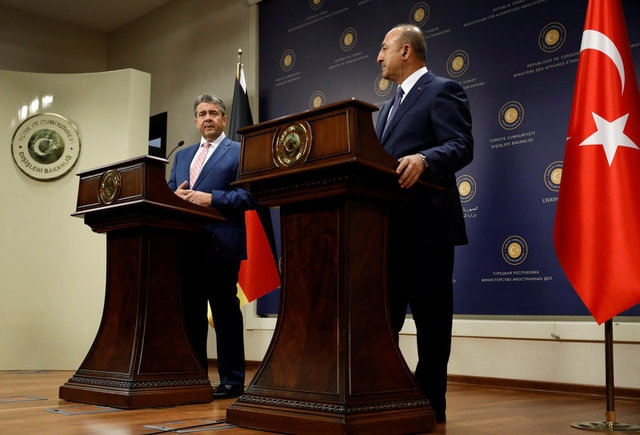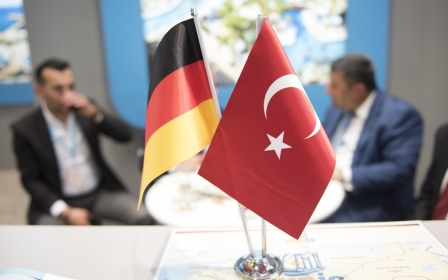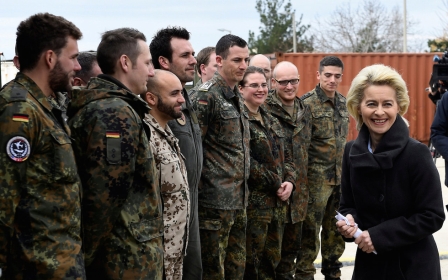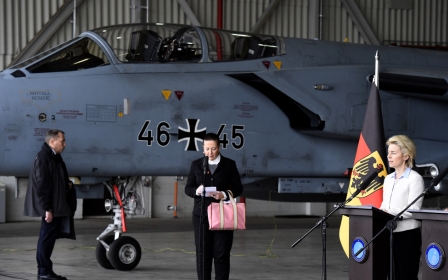Germany says has no choice but to pull forces from Turkish air base

Germany will have to pull its forces out of the Incirlik air force base in southern Turkey because of Turkish government restrictions on German lawmakers seeking to visit troops there, Foreign Minister Sigmar Gabriel said on Monday.
Gabriel was speaking after a meeting in Ankara with his Turkish counterpart, Mevlut Cavusoglu, which had aimed to address the standoff over Incirlik and other diplomatic tensions between the two NATO allies.
"My Turkish colleague explained to me that in the current situation, Turkey is not able to allow every visit by German parliamentarians to Incirlik - for domestic reasons," Gabriel told a news conference.
"I regret that. Conversely, I ask for understanding that we - for domestic political reasons - must transfer soldiers out of Incirlik, because the German parliament has a parliamentary army and places value on German lawmakers being able to visit Bundeswehr soldiers at any time."
Shortly after he spoke, sources in Prime Minister Binali Yildirim's office said the Turkish premier had cancelled a planned meeting with Gabriel, citing a busy work schedule.
Turkey's ties with Germany and other European Union states deteriorated sharply in the run-up to Turkey's 16 April referendum that handed President Tayyip Erdogan stronger presidential powers.
Germany, citing security concerns, banned some Turkish politicians from addressing rallies of expatriate Turks before the referendum.
Ankara responded by accusing Berlin of "Nazi-like" tactics, drawing rebukes from Berlin.
Turkey has prevented German lawmakers from visiting the roughly 250 troops stationed at Incirlik as part of the US-led coalition against Islamic State, saying that Germany needs to improve its attitude first.
The troops are part of a German mission providing reconnaissance aircraft to support coalition operations in Iraq and Syria.
The two countries did not want the decision to transfer soldiers out of Incirlik to "further worsen our relationship", Gabriel said, and they both seek to restore the "good times" between Germany and Turkey.
"We believe that when we have settled this problem ... then we will have the chance to work on all the other points where we are firmly convinced that we have common interests".
Extradition demand
Aside from the Incirlik dispute, Germany has expressed concern about the security crackdown in Turkey after last year's failed coup. Some 150,000 people have been sacked or suspended from their jobs and 50,000 people jailed pending trial.
Turkish officials say the steps are necessary because of the gravity of the coup attempt, which killed 240 people.
But critics in Turkey and abroad say Erdogan is using the failed coup as a pretext to muzzle dissent and purge opponents.
German officials said last month that 414 Turkish citizens with diplomatic passports and other government work permits had requested asylum since the attempted putsch. Berlin's interior ministry has confirmed that asylum requests had been approved for a number of them, a move that angered Ankara.
"Those who seek asylum to escape Turkey and have been mixed up in the coup should be extradited," Cavusoglu told the news conference.
He said relations between the two countries, as well as regional cooperation, had suffered recently. "If Germany takes one step towards us, we can take two towards them, but we cannot overlook the current situation," he said.
Commenting on the case of German-Turkish journalist Deniz Yucel, whom Turkey arrested in February on a charge of spreading terrorist propaganda, Cavusoglu said there was a trend in Europe for intelligence agencies to use journalists as agents.
"The accusations about Yucel are not related to journalism, but rather to terror. This is a sensitive issue for all of us," he said, adding that Yucel's case was a matter for the courts. "Our independent judiciary is carrying out the process. The judiciary will make the decision on Yucel," Cavusoglu said.
Middle East Eye propose une couverture et une analyse indépendantes et incomparables du Moyen-Orient, de l’Afrique du Nord et d’autres régions du monde. Pour en savoir plus sur la reprise de ce contenu et les frais qui s’appliquent, veuillez remplir ce formulaire [en anglais]. Pour en savoir plus sur MEE, cliquez ici [en anglais].




